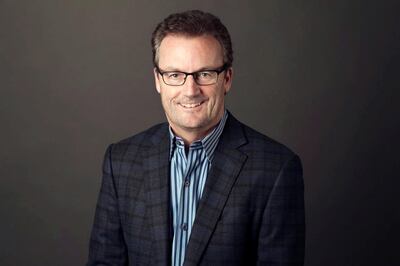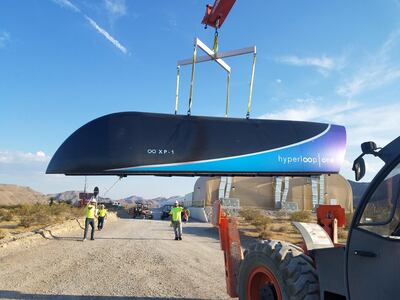Virgin Hyperloop One, the futuristic transportation concept inspired by Elon Musk that promises to connect cities at speeds of 700 miles per hour, expects to see the first rollout of its technology by 2019, its chief executive said.
“Somewhere in the world we are very confident that we would begin construction in 2019 with initial testing at production level in 2021,” Rob Lloyd said in an interview with The National. “We are in discussions in Northern Europe, in the UAE and in discussions in the United States. I can’t say where the first one will be.”
The company has thus far raised US$245 million. Its backers include billionaire Virgin Group founder Richard Branson, who participated in the last round funding that consequently led to its rebranding. Its investors also include DP World, Sherpa Capital, 137 Ventures, Caspian VC Partners (part of Summa Group), Formation 8, SNCF, GE Ventures, Zhen Fund, Fast Digital and OurCrowd.com.
“DP World has been a major supporter and investor of our company. They have been an advocate of understanding the use of our technology in logistics and freight,” Lloyd said. “They have been a fantastic partner. They have been a great example of the kind of the partner that’s helped us make the progress that we have.”
_____________
Read more:
Branson's Virgin forms partnership with Hyperloop One investment
Hyperloop may be more trouble than it's worth
Life in the fast lane - the future of transport in the UAE
_____________
DP World Chairman Sultan bin Sulayem sits on the board of Virgin Hyperloop. Dubai's Road and Transport Authority has been in active talks with the company, assessing the feasibility of a project that would deploy train-like capsules that float on air and travel at high speeds through a low-pressure tube.
"The vision for the UAE is a network that connects nine endpoints and the airports with a Hyperloop," said Lloyd. "The initial work that we are doing at great detail is with the Road and Transport Authority. We continue to have discussions as to how that preliminary feasibility study could be turning into the next stage of deployment."
A hyperloop project's costs run into the billions of dollars, but several critics argue its true costs have been underestimated. While Elon Musk originally estimated a hyperloop between Los Angeles and the San Francisco Bay Area would cost upward of $6bn, Michael Anderson, a professor of agricultural and resource economics at the University of California Berkeley, estimated the true cost including land purchases would run to closer to $100bn.
Other critics have argued that the cost of using a hyperloop system would be prohibitively expensive, only addressing the transportation needs of wealthy travellers. Even if a hyperloop system connected major cities, it's argued it would be only used by relatively infrequent white-collar business and leisure travellers.
Lloyd swiftly dismissed such criticism saying it was inaccurate, maintaining that hyperloop technology will be two thirds the cost of high speed rail and performance factors will be up to two to three times faster.
“We think it’s inclusive it’s for everyone, we do not think it’s elitist,” he said. “To create the substitution rates to a new mode of transportation, assume that you’re going three times or four times faster. If we price that as the same price as the existing mode of transport whatever that is, every financial model we’re building today is based on the fact that we are pricing at the current level of alternative modes of transport and offering up to 4 times advantages in terms of speed and convenience. Any time that’s happened anywhere in the world you get a very high substitution rate from the existing mode to the new mode.”
As an example, he cited how rail overtook flying between Paris and Brussels. The high speed Thalys train connects the cities in under 90 minutes, reducing the flight frequency between the two destinations. A cost of a ticket between two destinations that are 50 to 60 kilometres apart could be priced at $5, Lloyd said.
Though the hyperloop technology is clearly disruptive, its high deployment costs mean the company will need to raise new capital for it to alter the dynamics of transportation.
Saudi Arabia, which last week announced Neom, a $500bn futuristic investment zone on the Red Sea, could potentially be a strategic investor given the alignment between the vision for the new city and the technology of the hyperloop system.
When asked if the company was planning an initial public offering, Lloyd said: “A company like ours that governments like to have transparency, to understand the governance that’s in place for a company that will be deploying infrastructure that often fits the rigour of a public company. In our opinion, the company we’re building today and the company we’re driving towards would be an excellent public company. It is something that would make sense in the future.”



